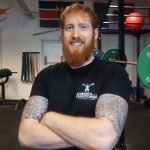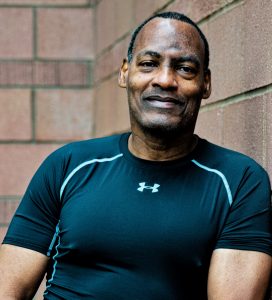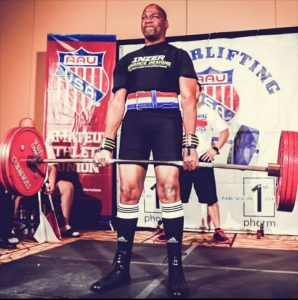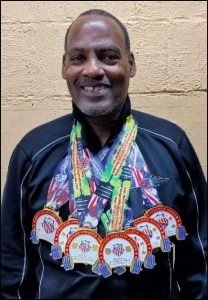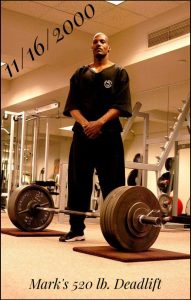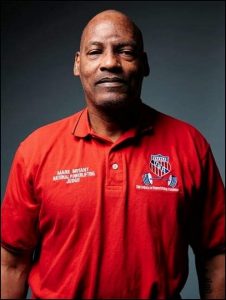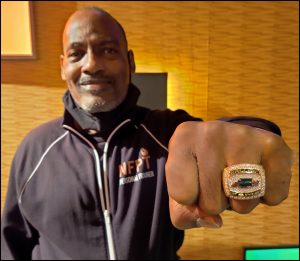INTRODUCTION
Hey, welcome to our fourth Meet the Expert blog.
In this blog, we interview expert coaches and athletes, delving into what makes them tick, what drives them to keep going, and what they believe to be the pitfalls and keys to success.
Let’s get to it!
Question 1: What is your name, age and where are you from?
My name is Mark Bryant. I’m 62 years old. I am originally from Queens, New York, but I have lived in Seattle, Washington for well over two decades.
Question 2: What is your occupation? Is it what you are known for or completely separate? What jobs have you done in the past?
I am a fitness professional and Powerlifting coach. I am probably most known for my work as a senior fitness professional with the South East Seattle Senior Center, however, where I have been for 15 years. In the 1990s and early 2000s, I taught aerobics classes in chain sports clubs throughout the Northwest. Later on, I also began volunteering with the Union Gospel Mission in Seattle, teaching fitness to the youth I worked with there.
Question 3: What is your primary area of expertise and why are you passionate about it?
I have worked diligently to learn as much as I can within the fitness realm, and my primary area of expertise is in senior fitness. My goal is always to ensure people have the tools they need to be their fittest selves, and the senior population is no exception. Seniors are one of our society’s most vulnerable populations, often lacking social outlets and becoming discouraged by what they believe they aren’t able to do any longer. Tapping into my vast fitness knowledge base (and using a little humor), I have been able to create a program that provides a social space for seniors in their community while they learn what their bodies can still do. They leave stronger, more mobile, more confident, and more independent.
Question 4: How did you get started doing what you do?
I wanted to expand my knowledge of fitness to those in the aging population after teaching high intensity aerobics for so long. I became a Certified Senior Fitness Instructor in 2005 and jumped into teaching senior fitness classes in Seattle.
I got started in the sport of powerlifting in 1999. I was working out in a gym and overheard a Powerlifting coach using fitness terminology I recognized from my schooling in health and fitness technology. Needless to say, I was impressed by his knowledge base. I approached him and almost immediately hired him as my Powerlifting coach.
Powerlifting is a sport in which I have been able to apply all my fitness and anatomy knowledge into my performance as an athlete. It is also a sport in which I can compete against myself on a consistent basis. Powerlifting is an immensely supportive sport, and athletes often form bonds with their competitors over years of competition.
After years of competing and winning state, American, and world championship awards, all the while learning more and more about fitness, anatomy, and physiology, I studied to become a certified Powerlifting coach. While I still compete, I have also been able to coach two world champion Powerlifters and several state champions, as well. In addition to being a Powerlifting coach, I also studied to become a Washington State and national Powerlifting judge for the Amateur Athletic Union (AAU).
Question 5: What are your weaknesses? What hurdles did you face and how did you overcome these barriers?
As a coach, I have sometimes struggled with communication. I realized that I had come off pushier than I had wanted, and knew I needed to listen more. In a concerted effort to be a better coach, I took several leadership courses in order to be a better leader and to learn to communicate with empathy. I think I’ve built more solid and significant relationships with my athletes as a result.
As an athlete, I have found that while I am not opposed to teamwork, I much prefer to work independently; it is what makes Powerlifting an ideal sport for me. Making team connections has been a bit of a challenge in the past, but I understand how strengthening those connections strengthens the team as a whole.
Question 6: What are your biggest strengths, both as a coach/athlete and an individual? What do you believe to be the primary reasons for your success? What do you consider to be your biggest success so far?
My greatest strengths include my broad knowledge of anatomy and years of lifting and competition experience. This has been invaluable for my athletes, who learn more about the nuances of Powerlifting and they can use their own anatomy to their advantage while training.
I attribute my success to my commitment to hard work, determination, and believing in my own ability. It is this mindset that aided me through my hip replacement surgery and recovery in 2008. It would have been easy to be discouraged and to question the likelihood of returning to competitive lifting but maintaining a positive attitude and remaining determined was likely my saving grace. Six months after surgery, I was competing again!
In addition to a successful recovery, my greatest success and proudest moments as an athlete have been my Hall of Fame inductions. I was inducted into the Washington State Strength and Power Hall of Fame in 2019 and the AAU Washington State Strengths Sports Hall of Fame in 2016.
As a coach, my work and success as a coach culminated into being awarded Coach of the Year in 2019.
Question 7: Where do you think a lot of people go wrong and what general pieces of advice would you give to those looking to excel in areas similar to yours?
I think a lot of people struggle when they stop believing in themselves. You must believe in your abilities and what you can accomplish. If you don’t, the motivation doesn’t exist to get anything done.
I’ve seen this struggle first-hand. An athlete starts out strong, which feeds into their confidence in their performance. An obstacle arises, and because it disrupts their performance, it also erodes their confidence, and they tend to give up on themselves. Athletes have to remember that this may not always be easy, just as it hadn’t been when they first started. Remembering it was their perseverance and determination that helped them get to this point is paramount in their success.
Question 8: Are there any rules or quotes that you live by?
This is more of question you ask yourself than a quote– “How bad you want it?” If you want something bad enough, nothing will stop you from getting what you are after. Believing in yourself is a rule you must live by to be successful in any area.
Question 9: What are your plans for the near future? What goals do you currently have?
I plan on competing in and coaching my athletes in preparation for more Powerlifting competitions. I also look forward to collecting more Powerlifting medals with a smile!
I envision educating all people within the fitness realm about fitness and anatomy. This also includes educating athletes in an effort to improve their performance in their respective sports. Another goal of mine is to have a renowned powerlifting team.
Question 10: Where do you see yourself in 5 Years? What is your ultimate goal?
My ultimate goal and what I would love to accomplish in the next 5 years is to have a national television platform where my focus is getting the masses fit and educated about fitness!
CHECK OUT MARK’S CONTENT
Website: https://fitnessexpertmark.com
A WORD FROM THE AUTHOR
I absolutely loved reading Mark’s answers, I could tell straight away what a great coach Mark is and an all-round decent guy!
Mark is a perfect example of the people we need in the fitness industry – passionate people that dedicate themselves to the trade, are willing to learn and truthfully analyze their own ability, and most of all, have a good time doing it!
I would love to head over to the states and meet with Mark some time, he sounds like a true legend!
If you are keen to feature in our Meet the Expert Blog and Newsletter, drop us an email to [email protected] and we will send you an intro pack.
Coach Curtis
